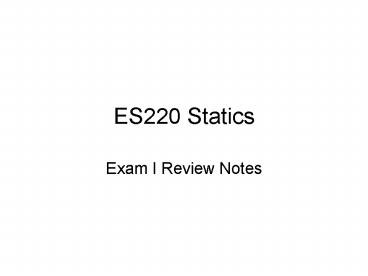ES220 Statics - PowerPoint PPT Presentation
1 / 35
Title:
ES220 Statics
Description:
Create a Force-Couple System at a Chosen Point. F. F. F. F. F. MA. d. MA = d F. A. B. A. B. A. B ... . R. R. R. R. Rx. Rx. Ry. Ry. dx. MA. dx R = MA. B. B ... – PowerPoint PPT presentation
Number of Views:47
Avg rating:3.0/5.0
Title: ES220 Statics
1
ES220 Statics
- Exam I Review Notes
2
Statics of Particles
- Chapter 2
3
Particle Motion
- Translation
- Caused by a Force
- Several applied Forces
- Determine magnitude and direction of single
resultant force, which determines direction of
impending translation. - Statics Interested in balancing applied forces
to prevent translation (called Equilibrium)
4
Force is a Vector
- A Force consists of
- Magnitude
- Direction
- Line of Action
- Sense
- Point of application
- For a particle, all forces act at the same point
of application - (contrast with a scalar, which has only a
magnitude)
5
Forces (Vectors) Add by the Parallelogram Law
- Can solve
- Graphically
- Using trigonometry
- Resolve into x and y components
- R is the resultant force acting on particle A
6
Simple Example
7
Solve using Trigonometry
Law of sines
Law of cosines
8
Resolving Vectors intox and y Components
Unit vectors
f
?
9
Resultant Force Actingon a Particle
Magnitude
Direction
10
Example
11
Forces in 3D
12
Magnitude Direction in 3D
Magnitude Direction
13
Determining Forces from Unit Vectors
dy
dz
dx
14
Equilibrium
- Using Components
- Graphically
15
Equilibrium Problems
- In 2D, have 2 equations, so can solve for 2
unknowns - Find magnitudes of two forces with known
directions - Find magnitude and direction of one force,
knowing magnitude and direction of other force(s) - In 3D have 3 equations, so can solve for 3
unknowns
16
Rigid Bodies Equivalent Systems of Forces
- Chapter 3
17
Rigid Body Motion
- Translation
- Caused by a Force
- Rotation
- Caused by a Moment
- A Force acting at a distance from a Point
- Several applied Moments
- Determine magnitude and direction of single
resultant moment, which determines direction of
impending rotation.
18
Forces
- Principal of Transmissibility
- Can slide a force along its line of action
19
Moment of a Force about a Point
- Moment Vector
- Magnitude
- Position Vector
- Perpendicular distance d
20
Determining Moments in 2D
Determine or - by the right hand rule For the
picture here
21
Determining Moments in 2D
- Right Hand Rule
22
Determining Moments in 3D
- Moment Vector
- Position Vector
23
Calculating a Vector Cross Product
1
2
3
4
5
6
24
Scalar Product
- Find the angle between two vectors, knowing the
components - Find the projection of a vector onto the line of
action of another vector
25
Moment of a Force, F,About a Line, OL
MOL measures the tendency for the force, F,
applied at A to cause the rigid body to rotate
about line OL
Called a mixed triple product
26
Moment of a Couple
- A Couple consists of two forces
- Same magnitude
- Parallel lines of action (but not co-linear)
- Opposite sense
- Moment caused by the couple
d
Direction determined by right hand rule
27
Moments Caused by Couples
- Moment vector caused by a couple is sometimes
called a couple vector - Has components
- Moment caused by a couple is a free vector you
can place it at any point
28
Moments Caused by Couples
- Can add moments caused by two or more couples
- In 2D
Determine or - by the right hand rule
29
Equivalent Couples
- Two couples are equivalent if they cause the same
moment
30
Force-Couple System
- A force, F, acting at point A can be replaced by
the force, F, and a moment, MO, acting at point O.
31
Create a Force-Couple System at a Chosen Point
F
F
F
F
A
B
A
B
A
B
MA
d
F
MA d F
32
Replace a Force-Couple System with Just Forces
F
F
A
A
F2
d2
MA
F2
C
C
d2 F2 MA
33
Reducing a System of Forces to a Resultant
Force-Couple System (at a Chosen Point)
F1
R
r1
r2
F2
A
r3
MA
F3
34
Reduce a System of Forces to a Single Resultant
Force
F1
R
R
R
r1
r2
B
F2
A
r3
MA
MA
R
R
F3
B
Using method from prior slide
35
R
R
Ry
B
B
A
Rx
Rx
A
Ry
MA
R
R
dx
dx R MA



























![L 13 Fluids [2]: Fluid Statics ? fluids at rest PowerPoint PPT Presentation](https://s3.amazonaws.com/images.powershow.com/4554830.th0.jpg?_=20131111015)



